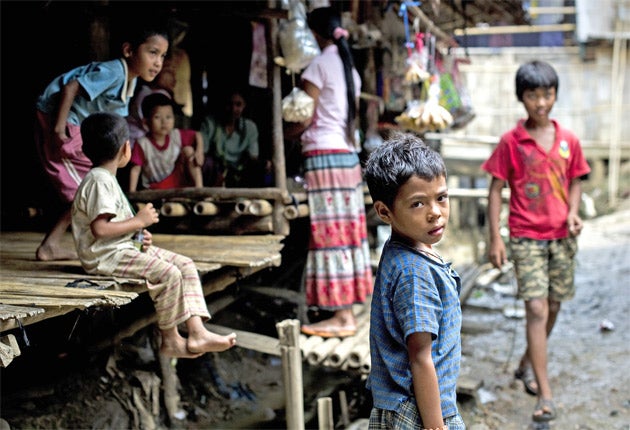Anger over Thai plan to return Burmese refugees

Your support helps us to tell the story
From reproductive rights to climate change to Big Tech, The Independent is on the ground when the story is developing. Whether it's investigating the financials of Elon Musk's pro-Trump PAC or producing our latest documentary, 'The A Word', which shines a light on the American women fighting for reproductive rights, we know how important it is to parse out the facts from the messaging.
At such a critical moment in US history, we need reporters on the ground. Your donation allows us to keep sending journalists to speak to both sides of the story.
The Independent is trusted by Americans across the entire political spectrum. And unlike many other quality news outlets, we choose not to lock Americans out of our reporting and analysis with paywalls. We believe quality journalism should be available to everyone, paid for by those who can afford it.
Your support makes all the difference.Thai authorities have sparked an outcry by revealing that they are in talks with Burma over proposals to send more than 140,000 refugees back across the border. The head of the national security council, Tawin Pleansri, said the government planned to close camps established along the border with Burma over the past two decades and make residents return.
"They have been in Thailand for more than 20 years and it became our burden to take care of them," he said. "I cannot say when we will close down the camps, but we intend to do it. We are now in the process of discussion with the Burmese government."
Aid agencies say there are at least 140,000 refugees living in the camps and that many are members of Burmese ethnic tribes which have suffered repeated repression at the hands of the Burmese army. Even today, say aid groups, new refugees are making the journey across the border to seek sanctuary inside the camps.
"It's impossible to close these camps. It would put people back into a dangerous place, to a place where international NGOs have no access," said K'nyaw Paw of the Karen Women's Organisation, speaking from the border town of Mae Sot, close to several of the camps. "It would be forced repatriation if they did this. No one from the government has spoken to the people in the camps."
Ms Paw said claims by the Thai authorities that the Burmese government had been transformed to a civilian administration in the aftermath of last year's controversial election were entirely false. While the junta had officially been disbanded, the military and its senior general, Than Shwe, remained in control. "All they have done is change their clothes," she said.
The camps inside Thailand are overseen and operated by the Thai-Burma Border Consortium, a coalition of aid groups that provides food and medical care for the refugees, who live in bamboo huts and behind barbed wire. The refugees' movements are strictly controlled and some have liked the camps to "green prisons".
When The Independent visited the camps, many of the refugees spoke of their desire to return to Burma, but only when the situation was safe to do so. The Karen people are among those tribes who have repeatedly suffered murder and repression in attacks by the Burmese army that have seen them increasingly lose control of swaths of their territory.
Mark Farmaner, of the Burma Campaign UK, said that over the years anywhere up to 65,000 refugees had been voluntarily relocated to third countries, including the US, Norway, Ireland and the UK. "The fact that this has happened and yet the total number in the camps is not going down shows that the root causes of what is driving people there has not been addressed," he said.
Mr Farmaner said that the governor of Thailand's Tak province, where many of the camps are located, had recently stepped up persecution of the refugees. He believed a series of hydro-electricity plants being planned in the east of Burma, and which would provide power for Thailand, may be a factor in the decision by Thai officials to please the Burmese authorities.
Yesterday, Thailand's Prime Minister, Abhisit Vejjajiva – who is preparing for an election contest this summer – was questioned about the plans to close the camps. He told reporters that the refugees would be sent back "when it's safe for them to return".
Join our commenting forum
Join thought-provoking conversations, follow other Independent readers and see their replies
Comments